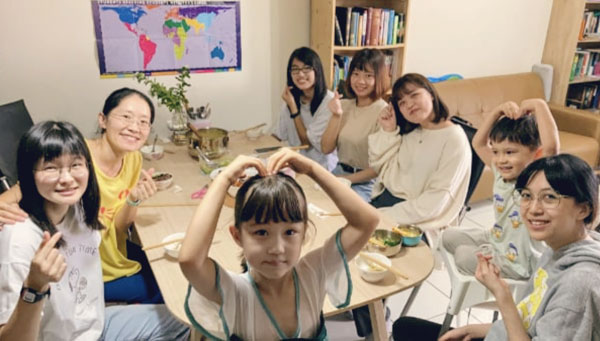Checkpoint Autumn 2022: A hard conversation brings insight
CMS missionary Shan-Shan Chrisp, with her husband Sam, is serving in Taiwan. In this article she tells how tension in a discipling relationship led to deep and valuable insights.
I had been discipling a Christian woman from church by meeting one-to-one with her and working through Paul’s letter to the Colossians. One time as we met and were chatting about how she was doing, she became angry. I was surprised, and I struggled with the uneasiness of the situation. After taking some time to acknowledge and explore these emotions, we came to realise what was going on.
This friend had been experiencing relational difficulties and she had sought advice from me as well as from the leaders at church. Rationally, she agreed that our advice was godly—but felt she wasn’t up to applying it. However, she still forced herself to follow our suggestions because she thought it was what God wanted her to do. She had taken our advice as authoritative to the point of viewing it as God’s direct guidance.
Furthermore, her expectation was that if she did what we suggested then God should bring about change in the difficult relationship. When there was no immediate change in the relationship, she felt disappointed and angry. As we talked through the issue, she came to understand that she had been relating to God in a transactional way, thinking that if she did what he said then he should bring about the change she longed for. She knew that this was not the way God has shown us in his word to relate to him, but unconsciously she had carried this view over from her cultural heritage and previous church experiences.
Two lessons from a difficult experience
God used this incident to remind my friend and I of two truths.
Firstly, people today do not speak with God’s authority. God has spoken to us in scripture and the Bible is our authority, not the words of other people.
Secondly, God cannot be manipulated to do our will, for he is God and we are not. My friend and I learned again, together, that we obey him because he is the Lord of our lives—not because we can get what we want. Yet as we obey our loving and faithful God, we can trust that in his perfect will he is bringing about what is good for us, even if it is not what we think we want right now. We should look back at the cross as the demonstration and assurance of God’s love.
Culture and discipleship
For me, this and other experiences have caused me to reflect on culture and discipleship. The communal culture in Taiwan has a strong emphasis on a concept called 人情 (ren quing), which literally translates as ‘human feeling’ and shapes the conventions of human relationships.

Shan-Shan and the kids, Jasmine and Elijah, having lunch with the leaders from Shan-Shan’s university fellowship group.
These conventions are complex, but in part it is the idea that when someone does something for another, relational credit is owed and the favour ought to be returned. This is similar to the way interactions with temple idols work within the local folk religion. A person gives an offering that the idol wants, and in return expects the idol to bring about the person’s request. This ren quing is so integral to the way relationships work here that it is no wonder—consciously or unconsciously—that it easily gets transposed to a local believer’s relationship with God. I am still seeking to understand ren quing more and working out contextually what it means for local believers as they mature in Christ.
I have also reflected on the need to take care in giving advice in the context of this culture’s hierarchical nature. I don’t want local Christians to be motivated by the fact that they have been told by ‘the missionary’ (who may be perceived as an authority) to do something. Instead, it is my hope that all of us together would be motivated by the gospel, living out of allegiance to God and prayerful dependence on the work of the Holy Spirit.
These cultural lessons and nuances take a long time to grasp and understand. Please pray for God’s wisdom and grace in discovering and applying these insights.
![]()
GIVE
Cultural insight takes years to develop, which is why CMS is committed to supporting missionaries like the Chrisps to serve for many years in their location. Will you commit to long-term financial support of CMS workers? Start giving regularly at give.cms.org.au












































































































